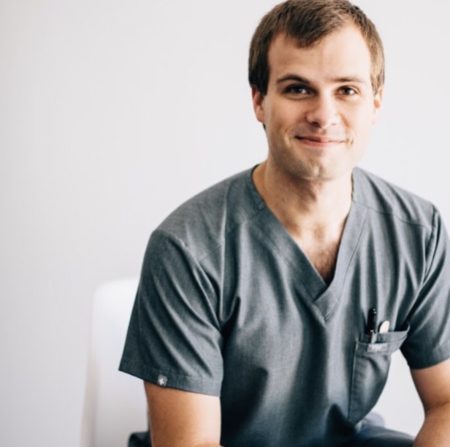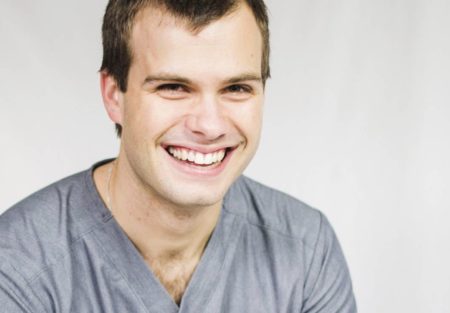Stephen is a medical speech-language pathologist who spends his time treating stroke, dementia, and Traumatic Brain Injury sufferers so they can talk, think, and swallow again – for as long as they can.
He is passionate about bedside manners, patient centered care, and helping you to become the clinician everybody loves. In this feature, we gain insight and understanding into the significance of his job and his true appreciation of nurses (or should we say, unicorns?).
“Without nurses we’d have no viable healthcare system. At all.”
Nursing and Medical Speech-Language Pathology
Stephen was born in Corpus Christi, TX and got his bachelors and masters from Vanderbilt University in Nashville, TN. He just relocated to Lancaster county, PA, just outside of Philadelphia, where his wife is from. They welcomed their first child into this amazing, wonderful, messy world in May 2018!
Last January, he released his e-book, “Bedside Manners For the Healthcare Pro,” which entails 25 useful interaction strategies to get through all the doubt and uncertainty keeping you from becoming the clinician everybody loves. As you read, it’ll become obvious how we can all take a page out of his book!
When did you decide you wanted to be a Speech-Language Pathologist?
For as long as I can remember, I’ve had trouble talking. Whether it was standing in front of my kindergarten class giving a presentation about horses or trying to fit in at the lunch table, where all the guys were talking about the latest Xbox game or the NFL playoffs. I’ve wrestled with a slight stutter for most of my life. When I was 16 years old, though, I decided I’d had enough. I was tired of having thoughts and ideas in my head hit a brick wall when I tried to get them out. I wanted to be known and loved for who I was. I was willing to do something, anything, to make that easier.

So I attended an intensive, two-week course run by a speech-language pathologist who also had stuttered and re-trained my brain to speak fluently using a number of specific behaviors. Though the therapy was arduous, I couldn’t argue with it because it worked like magic. When I was done, I could finally say anything I wanted to say and felt like a new person.
“It was then the first seed was planted that maybe I should give back and help other people speak more easily too.”
So now I help stroke sufferers tell their wives they love them, dementia patients remember who their children are, or people who struggle to eat more easily again, so they can share a meal with their grandchildren.
What’s your favorite part of your job?
I really love laughing with my patients. I’ve tried to understand the neural underpinnings of laughter, and I’m still thoroughly confused by it. But I love getting my patients out of their shells and making them laugh when there are so many things around them to cry about.
“I love getting my patients out of their shells and making them laugh when there are so many things around them to cry about.”
What do you wish the world understood about your profession?
Ah. Yes… that we don’t just help kids say their “r’s!” I can help you get thoughts, words, and ideas in and out of anyone who’s having difficulty. I do this by using my knowledge of neural somatosensory and receptive and expressive language networks. I can get someone to swallow again just like physical therapists can get someone to walk again. I can get your grandma to know where she is again and recognize you when you walk in the room even if she has advanced Alzheimer’s dementia.
If you value talking, eating, or thinking (what we spend a lot of our day doing), then you’d want me there if something went wrong.
What kind of education and clinical experience is required for Speech-Language Pathologists?
You need your master’s in SLP to be a speech-pathologist. You can prelude that with a bachelors in speech-pathology or communication sciences and disorders, but schools don’t always require it. Training includes the neural and physical anatomy and physiology of language (what you want to say), speech (how you say it), cognition (I think, therefore I am), and swallowing (how to not choke and die).
What are the various care settings you can work in?
There are two tracks you can take in speech-pathology: you can work with either children or adults. If you work with kids, you’ll help kids with autism, CP, developmental delays, speech impediments, learning disabilities, cleft lips and palates, nursing difficulties, and so on. You can work in a school, a private practice, or in a medical center. If you work with adults, you’ll likely help people who’ve had strokes, TBIs or who have Parkinson’s or Alzheimers. You typically work in acute care settings, short term rehab, long term care, or a private practice.
We have to ask: Why didn’t you become a nurse? Do you think you could be one?
My grandfather was a doctor in my town for 57 years. He was the chief of medicine and was loved by anyone who knew him. I always wanted to follow in his footsteps, but when I was younger I worried my stuttering would hold me back or put my patients at risk. So I gave up on the medical dream (nursing included!). But once I got my own speech therapy, every door seemed to open back up for me.
It wasn’t until my second year of grad school that I worked with my first patient who’d had a stroke and I realized I really loved working in the medical setting.
If I could go back, I might get my BSN or even try for my MD, but by the point I realized that, I was already too far in my studies that I couldn’t turn back. I really love the consistent emotional and moral support nurses give to their patients and absolutely think I would love being one. It just isn’t my road right now.
What were some of your first interactions with nurses like? What do your interactions with nurses now entail?
My first professional interactions with nurses were during my acute care clinical placement where we’d have to gather pertinent information from them regarding our patients whenever the MD’d order a speech or swallow evaluation. I really loved working with the ones who were interested in what we were doing and asked thoughtful questions and asked for recommendations. That made me feel really wanted and valued (which is what we all need really need in the end, isn’t it?)
In my most recent job, I worked with nurses on a couple of short-term rehab and long-term care units to help keep our patients safe from developing aspiration pneumonia, safe from falls and accidents, able to get their thoughts and words out, and able to regain their clarity of thought. It involved a lot of learning on my part about medical diagnoses, interventions, and side effects and a lot of teaching about what I help with. I ask a lot of questions, present my wishes humbly, and smile a lot.
What impresses you most about nurses?
I am constantly floored at how you can keep track of so many things at once. I seriously don’t know how you do it. You need like eight arms to do you job. And eight brains. I don’t know how you keep your sanity for twelve hours at a time. It’s truly so inspiring. Your breadth of knowledge is also astounding. You guys know. so. much. You’re like unicorns. Just unreal.
How do nurses make your job easier?
You do all the dirty work. ‘Nuff said. THANK YOU, THANK YOU, THANK YOU.
What’s something you didn’t know or weren’t able to appreciate about nurses until you worked alongside them?
I know I sound like a broken record, but how you can keep track of so much and still keep your personal touch with your patients. That much information overload would drown me and turn my into a shell of a human. But you all seem to be able to carry it with grace and connect with your patients even so. It’s truly impressive.

What’s one bit of advice you’d give a Speech-Language pathology student about nurses?
I’d say, “They get treated like crap most days. By patients, doctors, families, and administrators. Don’t do that. Without nurses we’d have no viable healthcare system. At all.”
What does the future of your career entail? How do you think healthcare delivery will change in the coming years?
Oh goodness. Don’t get me started! I wish healthcare was more like buying a phone from Apple, or going to the hot bar at Whole Foods, or ordering your favorite thing for CHEAP on Amazon. I wish it were simpler. And more beautiful. Just really great products and services at really great prices, really fast. No more crazy coding and absurd bills.
No more meddling middlemen and crazy-high premiums. And I hope we all get healthier as a country and start to prevent a lot of the illnesses we’ve got right now (lung cancer, diabetes, obesity, etc).
My career recently changed to working at a brand new, state-of-the-art Neuroscience Institute in central Pennsylvania and I launched a beautiful, affordable book called “Bedside Manners For the Healthcare Pro” to help you be the clinician everybody loves. Those two things are my two professional loves. Life is good.
Lastly, a few daily-life questions for you:
- Healthiest habit for work days: 10 minutes of mindfulness drumming in the morning (mindfully keeping the beat to three or four songs). It’s my kind of mindfulness and it makes me feel great.
- My work mornings usually start with… One cup of almond milk with a scoop and a half Ora Organic Protein and Superfood Powder. Stretching. Surrendering my control of my day.
- Go-to meal that I pack for work: Quick Buffalo Chicken Dip: pulled chicken shaken in a Mason jar with mayo, Cholula hot sauce, and pepper. Just add chips.
- Favorite thing to do on a day-off: Play a hard-fought match of tennis with my brother, Ben.
- Favorite app: Instagram.
- Clogs or sneakers? Sneakers! Black Nikes all. tha. way.
- If I wasn’t a SL Pathologist, I would probably be... a doctor or a nurse.
- Compression stockings, compression socks, or neither? I don’t use either, but I don’t stand on my feet for as long as y’all do!
- We’ve all got our ultimate patient aversion, what’s yours? I tend to see the best in all of my patients, but the dementia patients who’ve become nonverbal are always really hard to work with (I like talking if you can’t tell).
- Go-to choice of caffeine? I don’t drink any;) I know it sounds crazy. I might have to start soon though with my newborn!










.png)






